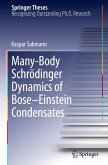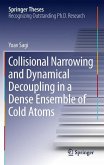Simulation of materials at the atomistic level is an important tool in studying microscopic structures and processes. The atomic interactions necessary for the simulations are correctly described by Quantum Mechanics, but the size of systems and the length of processes that can be modelled are still limited. The framework of Gaussian Approximation Potentials that is developed in this thesis allows us to generate interatomic potentials automatically, based on quantum mechanical data. The resulting potentials offer several orders of magnitude faster computations, while maintaining quantum mechanical accuracy. The method has already been successfully applied for semiconductors and metals.
From the reviews:
"This book is actually an account of the Ph.D. work of the author, and is aimed at practitioners of molecular simulation (physicists and materials scientists, mostly) who want to construct reliable empirical force fields parameterized by data obtained from equilibrium quantum mechanical computations." (Gabriel Stoltz, Mathematical Reviews, Issue 2011 j)
"This book is actually an account of the Ph.D. work of the author, and is aimed at practitioners of molecular simulation (physicists and materials scientists, mostly) who want to construct reliable empirical force fields parameterized by data obtained from equilibrium quantum mechanical computations." (Gabriel Stoltz, Mathematical Reviews, Issue 2011 j)








